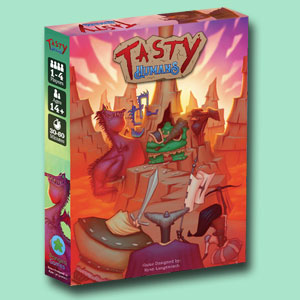Having your board game reviewed for the first time can be nervewracking. It’s difficult to send your brainchild to a critic who can influence the way your game is seen when it comes time to Kickstart or publish it. Much of the anxiety that new game developers experience when sending their games off to reviewers comes from the opaqueness of the process. That’s why I’ve brought in Dez Maggs of goto.game to talk about what goes into the board game review process.

Looking for more resources to help you on your board game design journey?
Here you go: no email required!
Like this writing style?
Check out my latest blog on marketing here.
I sent Dez a list of questions by email. His responses to my questions are below. They have been lightly edited for clarity and flow.
This article is broken into seven parts:
- Who is Dez?
- What do reviews involve?
- How long do reviews take?
- What do reviewers do?
- How can game devs make reviewers’ lives easier?
- What do you look for in games?
- Parting Advice
Who is Dez?
Brandon: Thank you so much for agreeing to this interview! To get started, tell me a little about yourself and Goto.game.
Dez: Goto.game has an amazing collection of content writers from all over Australia and New Zealand. We pride ourselves in being your one stop shop for all things gaming. Whether it is tech, events, video or board games; we cover it all.
I am their lead board game writer, which has allowed me to reach more people that enjoy gaming and open their eyes to the world of board games. I have had several streamers and video game players reach out to me and excitedly tell me that they bought that game I just reviewed or be shocked at how much about the industry they didn’t know or realize.
Goto.game has been a great platform for me, a place to share and inform people about what I love. It gives my reviews and – in turn – designers’ games, a big platform to be recognized by the large gaming community.
As for me personally, not much to tell, really. I love games and have ever since I can remember. I was given a copy of HeroQuest for my 6th birthday and it was played until it was literally falling apart.
From there, I went on to playing roleplaying games (I have a mad obsession for RPG Dice), then wargaming (more for the painting side of things, over actually playing). Recently, Kickstarter became popular, and it reignited my passion for board games.
What do reviews involve?
Brandon: What do reviews entail?
Dez: I’m lucky in that I have three semi-regular game nights. This allows me to play and turn around games quite quickly. I try to play each game a minimum of five times, but I prefer more if possible. During my playthroughs, I don’t take photos or write notes – I want the gameplay as organically as possible. This allows me to take mental notes on how easy it is to learn and whether others are enjoying the game. This makes it feel more fun and less like work for me.
Once I have played the game; the review is quite easy to write. After several years of experience, I have a formula I like to use for writing:
- Intro
- Game rules
- Brief game description
- My playthrough experience
- Art
- Issues
- Conclusion, including Kickstarter or store links
How long do reviews take?
Brandon: How much time does it take?
Dez: The actual write-up of the review normally takes me about an hour or so; depending on the complexity of the game and rules. It is funny, as people may read this and think “is that it?”
The most time-consuming part of reviewing is the actual playing of the games. Granted, I love playing them, but this truly is the hardest and most time-consuming part. If you think about some Euro games, they can take up to 2-3 hours to play. I play each game a minimum of 5 times, so you have literally spent 15 hours playing games, normally over several weeks. All for a piece that take people about 10 minutes to read.
This is worst-case scenario, of course. Small box games can be played over a gaming night and written about when I get home with about four hours of effort from start to finish.
What do reviewers do?

Brandon: What do most reviewers do and what do you do?
Dez: One thing that I don’t do, that a lot of other reviewers do, is give a score to the game. I have never done that, as I find what I consider a 7 vs. what others see as a 7 can differ considerably. This can lead to a very good game being overlooked or a mediocre game being funded.
I must say, the only person I have come across whose scoring method I like and think reviewers should follow is George of GJJ Games. He gives his score and shows a graphic underneath it that shows what each grade means. It limits the confusion and allows you to know exactly what he thinks of the game.
How can game devs make reviewers’ lives easier?
Brandon: How can board game developers make your life easy when it comes to reviews?
Dez: Time is a big factor for any reviewer. More time will often get you a better quality review.
A personal touch is always really nice. I have received several games that have had handwritten letters explaining the game and thanking me for taking the time to review their game. These letters could quite easily be just copied and pasted to the other 10 reviewers; but when your name is on there and they have taken the time to write or even print a letter it makes you feel valued.
Access to a Dropbox link with rules and art is a nice touch. If I get one of these, I normally have learned the rules by the time the game arrives. Not to mention, with prototypes that don’t come in a box, a picture of the box art makes life so much easier.
I also like when developers ask for a date they would like the review released. Some designers prefer it on the launch day and others prefer it several days before the launch to start the buzz for the game. As a reviewer, I like this. It allows me to better use my time.
What do you look for in games?
Brandon: What do you look for in games you review?
Dez: I look for a game I want to play. I’m a reviewer, but I’m a player first. If a game interests me as a player, I get excited about it and want to review it. I think for me, if I look at a game and would back it based on what I see or read about it, I will put up my hand to review it.
When I started out, I only did small box games and didn’t review anything other than them. This was mainly due to this being my personal taste in games. As I’ve grown as a gamer and experienced more games, my tastes have changed. Now I look for a great game, not the type or style of game it is.
Brandon: What happens if you like a game?
Dez: If I like a game, I will share it in the 10 different Facebook groups I’m a part of. I’ll retweet it during the campaign and try hard to get the word out throughout the whole campaign.
Brandon: What happens if you don’t like a game?
Dez: I will actually not review it if the game is that bad. I will return or not review about 8-10 games a year. I will always reach out the designer via email and make a list of all the problems or issues I found while playing the game.
It is probably the worst part about reviewing for me. I know the work, passion, and love that goes into making a game. Writing an email that lists and calls out the faults with a game is such a hard thing to do.
I try to not just give criticism but also constructive feedback as well as possible fixes. These emails normally take about the same time as actually writing a review.
I have been pretty lucky that most actually take it very well. Several have even gone back to the drawing board, redesigned the game, then funded.
Parting Advice
Brandon: If there were one critical piece of advice which you could give to game developers seeking a review, what would you tell them?
Dez: This is a tough question. I think “treat them like a friend.” You share a love and passion for the same thing: board games. Why not use that to grow a friendship and help one another? Reviewers are more likely to help you out or go above and beyond for a friend.
Reviewers have a wealth of knowledge. Get to know them and you’ll be surprised at what they can help you with. After doing reviews for some designers, they have reached out while making their next project for advice. I will always try to help them or introduce them to someone that can help them, as I consider them a friend.
This is a small industry and having more friends in the industry really makes for a better and more welcoming industry.
Having your board game reviewed doesn’t have to be scary. Reviewers are often passionate about board games, just like you are. Most want you to succeed. Be friendly, be organized, and try to understand their perspective.
Are you getting ready to send your board game off for review? Share your experiences in the comments below 🙂





3 thoughts on “An Inside Look at the Board Game Review Process”
Great interview, and thanks for the shout out!
Brandon, thanks for this behind-the-scenes interview! I’ve developed a few games that I played with friends, but I recently created a simple abstract strategy game that’s especially fun / interesting / challenging. Your blogs in this “Start to Finish” series have proved to be a fantastic class in the business of indie game development and marketing!